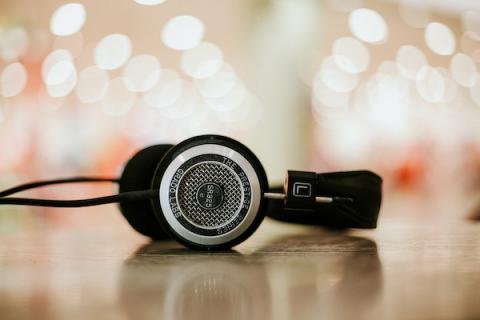
Did you know that using hearing aids can generate a world of improvement for your mental health and outlook on life?
October is the United Nations’ World Mental Health Month, and in observance of this important topic, we wanted to highlight the important connection between hearing loss and mental health.
If you’ve been ‘making do’ with hearing loss? We see you.
As Audiologists, we see patients rediscover a new lease on life once their hearing loss is treated.
Oftentimes, people don’t even realize how poorly they were feeling until they see how significantly their lives have improved with hearing aids.
Here are 10 ways hearing aids can help improve your mental health.
1. Hearing aids help improve memory and mental acuity
Studies show just 18 months after being fitted with hearing aids, participants reported:
- Improved cognitive function.
- Improved memory, communication and even skills like visual attention and visual learning.
- Significant improvement in executive function – the skills we use every day to learn and manage life.
2. Hearing aids help improve your relationships
Good communication is the cornerstone to strong relationships. And communication is a two-way street.
If the message isn’t getting through – due to untreated hearing loss – communication can become strained. Sound familiar?
The good news is that treating hearing loss can help you reconnect with those closest to you by helping you:
- Participate fully in conversations.
- Reduce the effort it takes to communicate with each other.
- Stay present and show others you are committed to hearing them through.
Taking steps to improve communication truly is an act of kindness to the people in your life.
3. Hearing aids help alleviate symptoms of depression
Studies show hearing loss and tinnitus can increase our risk of mental illness, including anxiety and depression.
While this correlation isn’t entirely surprising, there is a silver lining, and that is: depressive symptoms were significantly reduced among study participants after six months of wearing hearing aids.
Symptoms of depression include:
- Low mood
- Loss of interest in activities
- Sleep disturbance
- Fatigue
- Difficulty concentrating
If you are experiencing any of the above, it’s important to seek treatment. This is not your new normal.
Your family doctor will likely have some suggestions; and if you’ve been experiencing even mild hearing loss at the same time, an Audiologist may also be part of the solution to get you back on your feet.
4. Hearing aids help improve confidence in your general health
Our hearing has been called ‘the window of the body.’ That’s because hearing is connected to many other systems, including our brain, nerves, blood flow, and balance.
While hearing loss sometimes occurs on its own, other times, hearing loss occurs alongside other health conditions.
In addition to treating your hearing loss, an Audiologist will identify if you have any other health concerns that should be addressed by a doctor or ENT (Ear, Nose & Throat specialist), and assist with a referral.
5. Hearing aids help reduce your risk of dementia
In addition to helping your cognitive function and memory, treating hearing loss can actually also reduce your risk of developing dementia.
Because hearing and sound processing are so interconnected with brain function, hearing loss may contribute to a faster rate of brain atrophy, according to brain scans.
In fact, one study shows treating even mild hearing loss can reduce your risk of developing dementia by half.
If it has been more than two years since your last hearing test, see an Audiologist. If you can benefit from hearing aids, they may help protect you from dementia and Alzheimer’s disease.
6. Hearing aids help manage tinnitus
Tinnitus – often described as a phantom ringing in your ears – can also be characterized by 60 other sounds, such as buzzing, humming or hissing.
While most of the 37% of Canadians who experienced tinnitus last year described it as ‘non-bothersome,’ 7% of those affected said it affects their day-to-day activities.
Back-of-the-envelope calculations show that’s still close to a million Canadians!
Because tinnitus is most bothersome during times of quiet, wearing hearing aids can help cut the ringing in your ears by allowing you to hear a wider range of sounds.
Hearing aids also help by enabling you to focus in on the sounds you want to hear – like your TV or phone – and tune out the ghostly humming or hissing.
In addition to providing hearing aids, our Audiologists have also successfully helped hundreds of people through a combination of protocols that include Tinnitus Treatment as well as a mindfulness-based tinnitus reduction program.
7. Hearing aids help you get your energy back!
Coping with untreated hearing loss is tiring.
Our brains spend a lot of energy trying to concentrate harder in an effort to hear the sounds we know we should be able to hear.
Even our bodies strain – whether we’re hunching forward to listen intently, tilting our heads to get a better angle, or tensing in frustration at not being able to participate in conversation the way we would like.
At the end of the day, all this stress and effort adds up, and can result in feeling drained, or even depressed.
A simple fix – like using hearing aids – can help redirect your energy to more productive pursuits. And when you’re able to participate in those activities that make you feel invigorated, your energy levels surge in response.
8. Hearing aids help you enjoy music
Did you know modern hearing aids have special programs and settings specifically for listening to music?
In fact, with a Bluetooth connection and a hearing aid app, you can stream music directly into your hearing aids.
This is a game-changer for musicians and musicophiles, who may start to lose enjoyment when hearing loss becomes an issue.
Often, people report music starts to sound ‘flat’ when we can’t hear the high or low frequencies that provide that richness of sound we’ve grown to love.
If you’ve noticed a change in your favourite melody, check in with your Audiologist to see how we can get you back in your groove.
9. Hearing aids improve TV watching
Similar to music streaming, it is also possible to use Bluetooth to stream the sound from your television directly to your hearing aids..
This allows you to specifically control the TV volume on your hearing aids, while everyone else enjoys the volume from the TV speakers.
Most TV fans marvel at the clarity of speech they hear when they connect their hearing aids directly to the TV, and as a result, dialogue and plots are much easier to follow.
Plus: no more disagreements about the volume… although you’ll still have to agree on a program!
10. Hearing aids help reduce stress at work
Being able to hear clearly at work is an ability we often take for granted… until we start to lose it.
Hearing well at work helps us:
- Maintain positive relationships with colleagues and supervisors.
- Hear details and instructions correctly.
- Feel confident in meetings, whether in person, on phone calls or by video.
- Understand our work assignments and carry them out to the best of our abilities.
If you’ve noticed hearing loss is interfering with your ability to thrive at work, hearing aids can often restore that sense of capability.
If you’re ready to find out how hearing aids can help improve your own mental health and wellbeing, schedule a Hearing Evaluation.
Please call: Broadmead Hearing Clinic: 250-479-2969 or Oak Bay Hearing Clinic: 250-479-2921. Or request an appointment online.




